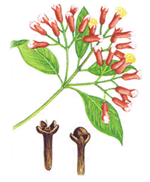
Clove Oil
Introduction
This fact sheet provides basic information about Clove Oil. The red clove plant originated in the lowlands, valleys, and hillsides of the southern Philippine islands and for centuries civilizations have used cloves for their homeopathic, medicinal, and culinary benefits. The essential clove oil, the most popular clove product, is extracted from the flower of the clove.Clove oil constituents include eugenol, eugenyl acetate, caryophyllene and iocaryophyllene.
Common Names
Clove, Clove Oil, Oil of CloveLatin Names
Eugenia caryophyllataWhat It Is Used For
- Clove oil has been and continues to be used in connection with respiratory ailments such as asthma and bronchitis, muscle aches, sprains and strains, arthritis and rheumatism. Many individuals use clove oil for its analgesic effects for body pain. Clove oil is one of the oils contained in Narayan Oil.
- Clove oil is considered by many in the health profession to be an effective antibiotic, antiseptic, antiviral, analgesic, antioxidant, carminative, expectorant, antifungal, anti-parasitic, spasmodic, and stimulant.
How It Is Used
As an herbal nutrient, drop 15 to 30 drops of clove oil in warm water and take this tea 1-3 times daily.What the Science Says
- Clove oil is widely used to mask unpleasant olfactory cues; however, there is no recent clinical evidence concerning therapeutic doses.
- Clove and clove oils are used safely in foods, beverages, and toothpastes. Toxicity has been observed following ingestion of the oil, but this rarely occurs.
Side Effects and Cautions
- Clove oil can irritate skin and mucous membranes.
Sources
- Drugs.Com Web site. Accessed on February 6, 2009.
- From Wikipedia, the free encyclopedia. Accessed on February 6, 2009.






